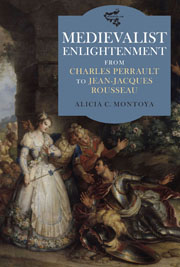6 - The Invention of Medieval Studies
from III - STUDYING THE MEDIEVAL
Published online by Cambridge University Press: 05 May 2013
Summary
This chapter examines how out of the galant, aristocratic engagement with the medieval whose contours I have sketched in the previous chapters, there emerged during the first decades of the eighteenth century a new, scholarly approach to the Middle Ages. This new, academic medievalism had its institutional basis at the Académie royale des Inscriptions et Belles-Lettres. Originally founded by Louis XIV to compose Latin commemorative inscriptions in his honour, during the eighteenth century the Academy evolved into a full-fledged scholarly body, focusing more exclusively on historical and philological activities, and shifting its emphasis from classical to medieval subjects. This process was accelerated by a royal reform that took place in 1701, made official by lettres patentes and new statutes in 1716, and was finally consolidated by the creation of a new academic journal in which the academicians could publish their findings, the Histoire et Mémoires de l'Académie royale des Inscriptions et Belles Lettres, that began publication in 1717 and continued uninterrupted until the revolutionary era. After the first important papers by Abbé de Vertot starting around 1705 (but published only a decade later), medieval studies entered a decisive new phase in the 1720s and 1730s, when they were taken up by an illustrious group of scholars that included Denis François Secousse, Jean-Baptiste La Curne de Sainte-Palaye, Antoine Lancelot, Camille Falconet, and the comte de Caylus, among others.
Of the scholars affiliated with the eighteenth-century Académie des Inscriptions, Sainte-Palaye has traditionally been singled out and hailed as the most important medievalist, if not the actual founding father of modern medieval studies, well before the advent of the more well-known nineteenth-century French philologists such as Gaston Paris and Joseph Bédier.
- Type
- Chapter
- Information
- Medievalist EnlightenmentFrom Charles Perrault to Jean-Jacques Rousseau, pp. 185 - 220Publisher: Boydell & BrewerPrint publication year: 2013



